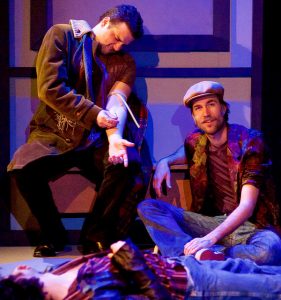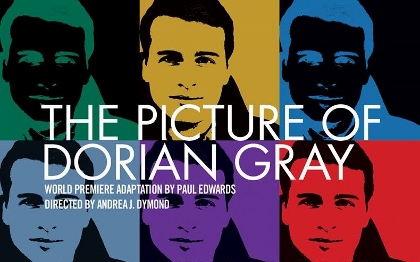DIFFICULT TO PICTURE
The Picture of Dorian Gray is its author’s self-portrait — perversely paradoxical, sardonically aesthetic, and (necessarily) obsessed with concealment. First published in 1890, ten years before the author’s death in exile, Oscar Wilde’s only novel is a curiously ambivalent embrace of and attack on decadence and depravity. Yes, it’s inevitably Victorian in its moralistic and melodramatic ending. But before that terrible reckoning Oscar is enthralled with his title character: a perfect pretty boy who radiates youthful innocence, despite a career of callous crimes. 20-year-old Dorian never ages, though, reflecting the ugliness of the Adonis’s furtive sins, his portrait turns toxic.
 Relying on Wilde’s quip that “the only way to get rid of a temptation is to yield to it,” The Picture of Dorian Gray is here updated from the gay (18)90s to the morally myopic 1970s and the “greed is good” 1980s. A City Lit Theater world premiere, Paul Edwards’ resetting skims like its source across a world of surfaces. Here appearance is everything and what you see is far less than you get.
Relying on Wilde’s quip that “the only way to get rid of a temptation is to yield to it,” The Picture of Dorian Gray is here updated from the gay (18)90s to the morally myopic 1970s and the “greed is good” 1980s. A City Lit Theater world premiere, Paul Edwards’ resetting skims like its source across a world of surfaces. Here appearance is everything and what you see is far less than you get.
Edwards finds equivalently cynical stereotypes for the 19th-century characters: Dorian is a social-climbing, cocaine-shooting party boy/photo model straight out of Studio 54. An amoral apostle of hedonism, Dorian’s corrupting and closeted mentor Henry Wotton is a Manhattan sybarite. Fashion photographer Basil Hallward, who takes the title picture, is a wanna-be Gotham aesthete who dotes dangerously on Dorian. The lad’s first human sacrifice, Sybil Vane, remains a bad actress: Her love for Dorian only enables his wicked pursuit of pleasure.
 Alas, Edwards’ predictable update adds nothing new to the novel (though appropriating Wilde’s dying words as Henry’s). Serious drawbacks mar both Edwards’ regrettable revisionism and Andrea J. Dymond’s tepid staging.
Alas, Edwards’ predictable update adds nothing new to the novel (though appropriating Wilde’s dying words as Henry’s). Serious drawbacks mar both Edwards’ regrettable revisionism and Andrea J. Dymond’s tepid staging.
Among the flaws of the former, this new version dispenses with Wilde’s most original touch — the gradual uglification of the picture. Here only a delusional Dorian believes that the photo has taken on his evil, the deal with the devil that preserves his beauty. But by the awful end we’re back to Wilde’s original reversal, with the picture restored to purity and a dying Dorian congealing into a no-longer-hidden hideousness. Wilde’s magical mirror of a persecuting portrait is just a silly resume headshot. The core contrast in the novel has been recklessly abandoned.
Worse, in a terrible throwback to a prejudiced past, Edwards conflates the AIDS virus with Henry’s debauchery and Dorian’s dirty deeds. Dorian is Patient Zero, until the end spreading disease without enduring it. Intentionally or not, this equation of vice and a virus takes us back to the bad old days of blaming the (homosexual) victims, here depicted, as Oscar Wilde never dared to do, as lovers. Whatever retribution Wilde intended for the excesses of Dorian’s “lifestyle,” it was not the punishment of a plague.
 The staging’s problems are as dire as the adaption’s defects: It’s torpid and off-beat, with too many pauses that don’t refresh. No Prince Charming, Javier Ferreira’s Dorian Gray does not suggest a gorgeous Narcissus who everyone adores. Both bored and boring, he’s petulant and pouty, unable to contrast Dorian’s outer loveliness with his inner rot.
The staging’s problems are as dire as the adaption’s defects: It’s torpid and off-beat, with too many pauses that don’t refresh. No Prince Charming, Javier Ferreira’s Dorian Gray does not suggest a gorgeous Narcissus who everyone adores. Both bored and boring, he’s petulant and pouty, unable to contrast Dorian’s outer loveliness with his inner rot.
The other roles fare slightly better. Gabriel Fries’ serviceable Basil seems sadly guileless as Dorian’s unquestioning admirer. Alyssa Thordarson is plaintively naïve as self-effacing Sybil (who posthumously narrates the second act). As both the play’s first-act narrator and the bitter old playboy Henry, a mumbling Scott Olson needs to project his lines (especially in the final scenes). Ryan Leonard and Stephen Rosenberger acquit themselves as, respectively, Sybil’s vengeful brother (here a Vietnam veteran with PTSD) and Dorian’s dutiful valet.
This botched experiment, an overly-deliberate, 135-minute revival, never achieves the momentum or urgency of its source. It fails to honor Oscar Wilde’s cunning combination of wit and horror.
The Picture of Dorian Gray
City Lit
Edgewater Presbyterian Church
1020 West Bryn Mawr Ave.
ends on April 15, 2018
for tickets, call 773.293.3682 or visit City Lit
for more shows, visit Theatre in Chicago




{ 1 comment… read it below or add one }
Just caught the last performance. I must say when Ferreira walked out, I thought ‘this guy?’…but was exceedingly pleased with his performance as Dorian. Cheeky and pouty, yes, but it worked! I thought he was terrific. As was the rest of the cast. Bravo!